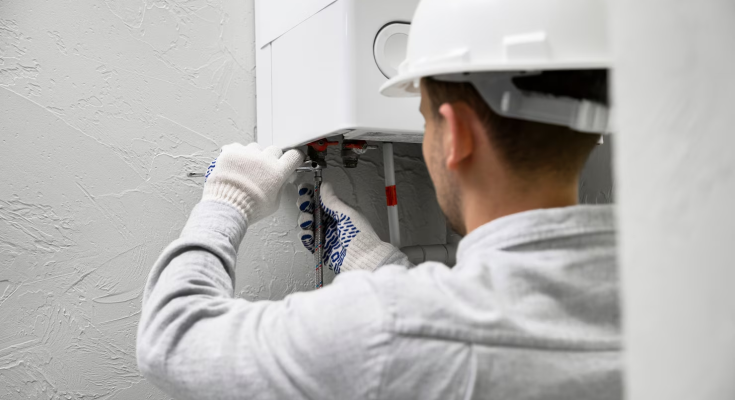Whether for laundry, baths, or dishwashing, hot water is a need rather than a luxury for the majority of homes. However, conventional water heating systems are among the largest contributors to monthly utility bills, frequently accounting for a sizable amount of household energy use. More homeowners are choosing high-efficiency water heaters as a more sensible option as a result of growing environmental consciousness and rising energy bills. These systems are made to use less energy while maintaining the same level of comfort, which lowers expenses without compromising functionality. You may make an informed choice that will assist the environment and your pocketbook by being aware of how they operate, the various varieties that are available, and the long-term advantages.
The Fundamentals of Water Heaters with High Efficiency
When you need hot water, high-efficiency water heaters are made to utilize the least amount of energy possible. In contrast to traditional models, which frequently waste energy by continuously heating enormous volumes of water, efficient systems make use of cutting-edge technology to reduce heat loss and optimize efficiency. Numerous of these units have earned the ENERGY STAR® certification, indicating that they adhere to stringent efficiency standards established by governmental organizations. They come in a variety of designs, such as high-efficiency storage tanks, hybrid types, and tankless water heaters. Although every alternative has its own benefits, they all aim to cut expenses and energy waste.
Storage vs Tankless: Which Is Better for You?
The choice between a tankless system and a conventional storage-tank heater is one of the most important ones that homeowners must make. By heating water only when it is required, tankless water heaters—also known as “on-demand” systems—eliminate the standby energy losses connected to storage tanks. They are therefore perfect for homes looking for energy-efficient, continuous hot water. High-efficiency storage-tank heaters, on the other hand, offer a balance between capacity and energy savings thanks to enhanced insulation and cutting-edge burner technology. Tankless units often cost more up front, but they last longer and offer more savings over time. In the end, the decision is based on hot water usage trends, household size, and financial constraints.
read more : How Digital Tools Are Transforming Modern Radio Broadcasting
Long-Term Value and Cost Savings
Although purchasing a high-efficiency water heater could cost more up front, there will be significant long-term savings. The U.S. Department of Energy claims that switching to a high-efficiency model can save households hundreds of dollars on power bills each year. Over the unit’s lifetime, which varies from 10 to 20 years based on the model, these savings mount up. Long-term homeowners find practical hot water systems particularly desirable because they frequently have the longest lifespans. To further lower the total cost, several areas can provide tax breaks and refunds for buying energy-efficient appliances. High-efficiency water heaters frequently pay for themselves in a few years when durability, energy savings, and relevant incentives are taken into consideration.
Efficiency’s Environmental Benefits
High-efficiency water heaters contribute significantly to lessening the environmental impact, in addition to saving money. Conventional models increase greenhouse gas emissions by using more energy than is necessary. Effective systems, on the other hand, employ sophisticated heating techniques that drastically reduce the amount of fuel or power wasted. This results in a noticeable decrease in the carbon footprint of environmentally conscious households. To further improve sustainability, some versions even incorporate solar panels and other renewable energy sources. In addition to improving your household’s financial situation, selecting an efficient water heater helps the worldwide effort to fight climate change and reduce energy use.
Realistic Aspects for Homeowners
To make sure you get the best water heater for your house, it’s crucial to take into account a number of useful aspects before making an upgrade. The size of the home and the amount of hot water used each day are important factors; smaller households typically find tankless systems more effective, while larger families may benefit from hybrid or storage-tank types. Additionally, different high-efficiency models may require different electrical or venting systems for installation. To determine compatibility and evaluate the demands of your house, it is advisable to speak with a qualified HVAC specialist or plumber.
Making the switch to a high-efficiency water heater is an investment in comfort, sustainability, and long-term value rather than just money. Even if the initial cost might be greater than for conventional versions, forward-thinking homeowners would be prudent to choose it because of the energy savings, durability, and possible rebates. You may save money without sacrificing comfort, whether you choose a tankless, hybrid, or sophisticated storage system.



